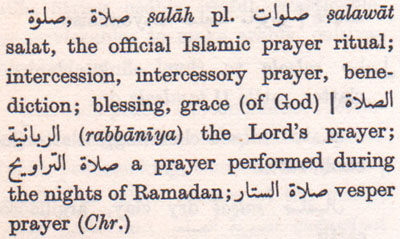There is a common claim circulated in Christian Arab circles with regard to the beatific phrase  (sallallahu ‘alayhi was-sallam) which comes as an eulogy to the Prophet’s name, translated as “peace be upon him” or often abbreviated as PBUH. It was first propagated in the English-speaking world by the Christian Arab missionary, Anis Shorrosh
(sallallahu ‘alayhi was-sallam) which comes as an eulogy to the Prophet’s name, translated as “peace be upon him” or often abbreviated as PBUH. It was first propagated in the English-speaking world by the Christian Arab missionary, Anis Shorrosh
-
…literally reads, “Lo ! Allah and His angels pray upon the prophet. Oh yea who believe, pray on him and salute him with peace.”
One is utterly confounded when the literal and real translation is understood. Why do our Muslim friends hide the real meaning of pbuh ? Is it because the Arabic statement is embarrassing since it contradicts Muslim doctrine ?
In the usual vein of missionary tradition, Shorrosh goes on to take the opportunity to blaspheme and make mockery of Allah(T) by accusing Him of praying[!] to a subject, but we shall not bother to cite further from his blasphemous work. Other Christian Arab polemicists such as Labib Mikhail
As expected, the rest of the Christian missionary world is not too far behind and they jumped on the bandwagon by rehashing a version of the argument proposed by these pseudo-intellectuals. Related to this is the argument that was recently repeated by the Christian missionary Shamoun in reference to several Qur’anic verses
-
Since these verses all clearly say that Allah literally prays, and since prayer requires an object, we must, therefore, ask to whom does Allah pray ? Muslims claim that Allah is a singular entity, there being no plurality of persons within his Being, which means that Allah cannot be praying to himself. Or is he ? Maybe Allah does in fact pray to himself.
Let us now directly address the issue of the phrase “peace be upon him” which the Christianity missionaries are fond of disputing.
[toc]
The Verb salla In Pre-Islamic Usage
In linguistics there is a phenomenon that is known as polysemy, which is defined as a word or phrase that may carry multiple dimensions or meanings in different situations. Ahmad Shehu Abdussalam explains it in the following :
Polysemy is a semantic state of a word in which it indicates two or more meanings. A word is polysemous when it looks the same as others and has more than one meaning…These varied meanings are known as “senses” (al-wujuh in the sciences of the Qur’an), and can be interrelated, shared in certain attributes or slightly different, indicating multiplicity of meaning, while varied forms of the same word, if any, are the “uses” (al-naza’ir in the sciences of the Qur’an). The word al-akhirah, with only one form (i.e., a use) has five senses : resurrection, paradise, hell, grave and the latter (Qur’an 92:13, 2:102, 39:9, 14:27 and 38:7 respectively).
Ahmad Shehu Abdussalam, Concordance of the Qur’an (International Islamic University of Malaysia Press:2008), p. 23
From the standpoint of the Arabic language, there is no reason to assume or charge that this phrase “contradicts Muslim doctrine” as Shorrosh alleges or that God is “praying to himself” as Shamoun claims, since it is known that in the context of usage for the verb salla, it generally meant as “to invoke blessings upon someone”. This usage is consistent in both pre-Qur’anic and the post-Qur’anic literature.
The following are some very interesting examples of its usage in pre-Islamic poetry.
The poet al-A’sha in describing how wine is preserved, says that :

And (the wine-dealer) exposed it to the wind in a jar, then invoked blessings upon (wa salla ala) the jar and sought assistance from God (so that the wine might not turn sour).
Noteworthy of this poetry is its usage in first “invoking blessings upon” (wa salla ala) the jar, and at the same time attempts to “sought assistance from God” with regard to the contents of the jar, hence signifying that the usage of the verb salla certainly does not mean “to pray upon” the subject as a deity. Rather, it is clear from this usage of this particular pre-Islamic verse that the idea of “invoking blessings [salla] upon” the subject is not an indication of direct worship, as it is inconceivable that a person would “worship” the jar and seek assistance from God, both at the same time ! Thus from the above verse, it is enough to demolish the claims of Shorrosh and Shamoun combined.
Yet we are obliged to add further salt to the wound of the missionaries’ blunder. Similarly, another pre-Islamic poem composed in praise of the Emperor of the Persian Empire by the poet ‘Antarah uses the verb salla as follows :

“All the kings of the earth pay homage [salla] to him from all places of the world (lit. from every valley-path); all people on earth turn their face towards him.“
An amusing missionary objection to the above is that all the kings of the earth were worshipping the Emperor literally when it is clear that there is certainly no such indication by the poet ‘Antarah. On the contrary, it is obvious even from the translation of this poem that the poet is invoking a glorification upon the Persian Emperor, rather than any indication of any form of worship.
Thus from the above exposition, it is clear that there is no reason to be “utterly confounded when the literal and real translation is understood” as Shorrosh alleges since the usage of salla has been in existence since pre-Islamic times.
The Verb salla In Islamic Usage
In the case of the phrase sallallahu ‘alayhi wa sallam, it is understood as an eulogy of God giving His Blessings upon someone

This translation is consistent elsewhere and Wehr confirms it as follows :

This is different from sallah, ritual prayer or worship in the connotations that the Christian missionaries intend it to be :

Would the missionaries now accuse Wehr of “embarrassment”, so much so that he translated sallallahu ‘alayhi wa sallam as “God bless him and grant him salvation!” in his dictionary ? Indeed, it is rather embarrassing for the missionaries to polemicize such a trivial matter.
What About Abraham And His Family ?
So far, the main crux of the Christian missionary disparagement is that the verb salla is invoked upon the Prophet Muhammad, upon whom be peace. The only reason that they are even raising the issue, if at all, is because the Prophet sallallahu ‘alayhi wa sallam is mentioned in God’s infinite Blessings. However, the missionaries are wrong to assume that only the Prophet Muhammad(P) is given this treatment as Muslims also apply this phrase to the Prophet Abraham(P) and his family in their daily prayers.

O Allah ! Send Your Mercy [salla] upon Muhammad and on his family [wives and his offspring], as You sent Your Mercy [salla] on Abraham’s family ; and send Your Blessings on Muhammad and his family, as You sent Your Blessings on Abraham’s family, in the world, for You are the Most Praise-worthy, the Most Glorious.
Now the missionaries have a problem that they have created for themselves. If it is true that the Prophet Muhammad(P) is the only Prophet that God “worships” to, they then have to explain how did this invocation which every Muslim recite in his prayers came about, and why the Prophet Abraham(P) is now mentioned in this prayer. For if we were to read the above prayer according to their interpretation, we would hence notice that :
- (a) The Prophet Abraham(P) and his family is yet among the various people that God Almighty “prays to”;
and ;
(b) The whole prayer above does not make any logical sense since the supplication is directed at God and it also states that God is the Most Praise-worthy and the Most Glorious.
Hence we can witness yet again the silliness of such a polemic which contravenes the strict monotheism of Islam. For now God does not only “pray to” Muhammad(P) and his family but He also indulges in the “worship” of Abraham(P) and his family ! How hilarious it is to see the missionaries digging a hole for themselves for which there is no way out.
Conclusions
Contrary to their claim, the verb salla indicates “praying to” a subject is not true and is a common polemic popularised by the Christian Arabs who only fall into the trap of their own ignorance of the Arabic language and its nuances. It is hence not surprising that their gullible English-speaking counterparts would, therefore, be eager to “snap up” such a polemic in verbatim — if only to discredit the religion of Islam — no matter whether the claim is true or otherwise. Thus do the missionaries attempt to disrupt universal consensus of Islam concerning God’s existence and unity, and of man’s obligation to serve Him by fulfilling His commandments which are the summum bonum : “We have sent no messenger but with the revelation that men are commanded to serve God and to avoid evil” (Qur’an 16:36).
It should be seriously noted that the Islamic dogma which was already well-developed by the turn of 2nd century A.H. had employed the beatific phrase sallallahu ‘alayhi wa sallam without any “embarrassment” whatsoever attached to it. Certainly, if the Muslims in that era had adopted the warped understanding of the missionaries in verbatim with regard to the root word/verb salla this beatific phrase would have never been used today by the Muslims !
It is also equally clear that even with the recent missionary “treatment” of the subject, there is no valid justification for their claim apart from their extreme perjury and hatred of Islam, i.e. Islamophobia. For each time the name “Muhammad” is mentioned, the hair bristles on their neck and they shamelessly assault the Prophet, sallallahu ‘alayhi wa sallam, by appealing to their fatuous theories and false accounts of history.
Hence, the misguided attempts of the Christian missionaries to negate the strict monotheism of Islam with their abuse of the verb salla falls flat to the ground, as do all those who lie and blaspheme for the non-existent, pseudo-monotheistic “Triune” god.
And only Allah(T) knows best, for He alone is worthy of worship. 


